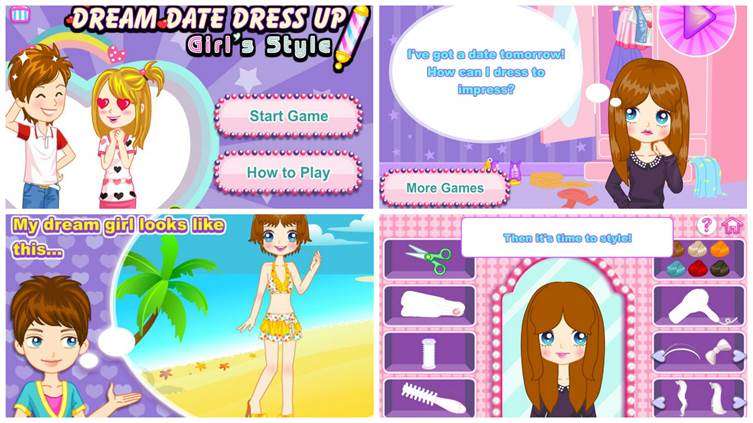Ten minutes on children's internet game enough to lower body satisfaction among young girls, study finds

Young girls reported heightened body dissatisfaction after playing a children's internet game for just 10 minutes, a study has found.
Primary school children expressed a more pronounced desire for a slimmer figure immediately after playing a free game which challenges players to give a female character a makeover for a date.
For the study conducted by the University of the West of England (UWE Bristol) youngsters played Dream Date Dress Up, one of several appearance-focussed games targeted at girls hosted on the Friv.com website.
A group of 40 eight and nine-year-olds from the South West of England played the makeover game, which sees players changing the hair and clothing of a female character to match a boy character's ideal. Another 40 played Penguin Diner, a game from the same website which is not based on appearance.
Participants were then instructed to select the silhouette of a body shape which most closely represented their own, and the one most desirable to them. Both groups recorded a preference for a slimmer figure but children who had played Dream Date
Dress Up registered a 'significantly' greater preference for a thinner body than those who had played Penguin Diner.
The research will be unveiled at Appearance Matters, the world's largest conference on body image and disfigurement. Staged in central London between June 28-30, the event will see more than 200 appearance experts from across the globe tackle issues including weight loss surgery, low cut clothing and 'ultra-thin' dolls.
Amy Slater, a Senior Research Fellow at the world-renowned Centre for Appearance Research (CAR), based at UWE Bristol, will tell the conference she undertook the experimental research on internet games to gauge their impact on children's body satisfaction and career aspirations. She said the findings were cause for concern.

Dr Slater, who worked on the study with colleagues Emma Halliwell and Hannah Jarman, said: "This is concerning because we know that girls who have body dissatisfaction at a young age are more likely to experience ongoing concerns when they grow up. Body dissatisfaction is known to be a risk factor for lowered self-esteem, disordered eating and depression.
"A game like that is sending a fairly blatant message for young girls that they need to change their appearance in order to be appealing to a boy and that you need to focus on your appearance to be attractive to the opposite sex.
"Young girls of six, seven, eight, nine and 10 are the target audience for this game. Do they need to even be thinking about how they would prepare to go on a date, and how they can make themselves look cute? This is not a helpful message for young girls to be focusing on.
"Even if they have not played this type of game, many young girls may be exposed to similar messages through magazines, advertising, clothing and toys."
In 2014, Ofcom highlighted that children were increasingly being attracted to multi-game websites such as Friv.com which contain a large number of mini games. Other appearance-related games on the site include Fashion Week Dress Up, Pin-up Facial Beauty and Selena's Date Rush.
Dr Slater chose to study the impact of internet games because their effect on young players had not been widely researched. It follows widespread public and political concern about girls 'growing up too quickly'.
She said: "It's useful for parents to be aware of the types of messages children are being exposed to. Lots of parents may not realise these messages are prevalent in game websites like this. It would also be useful to see more societal level changes, with improved regulation, and ideally game makers creating games which are appealing to young girls without containing these types of messages. We would welcome a discussion with the creators of these games.
"The study provides preliminary evidence that internet games with an appearance or sexualised focus may be detrimental to young girls' body image. Internet games should be included in our consideration of influential sources of appearance based message for young girls."

















